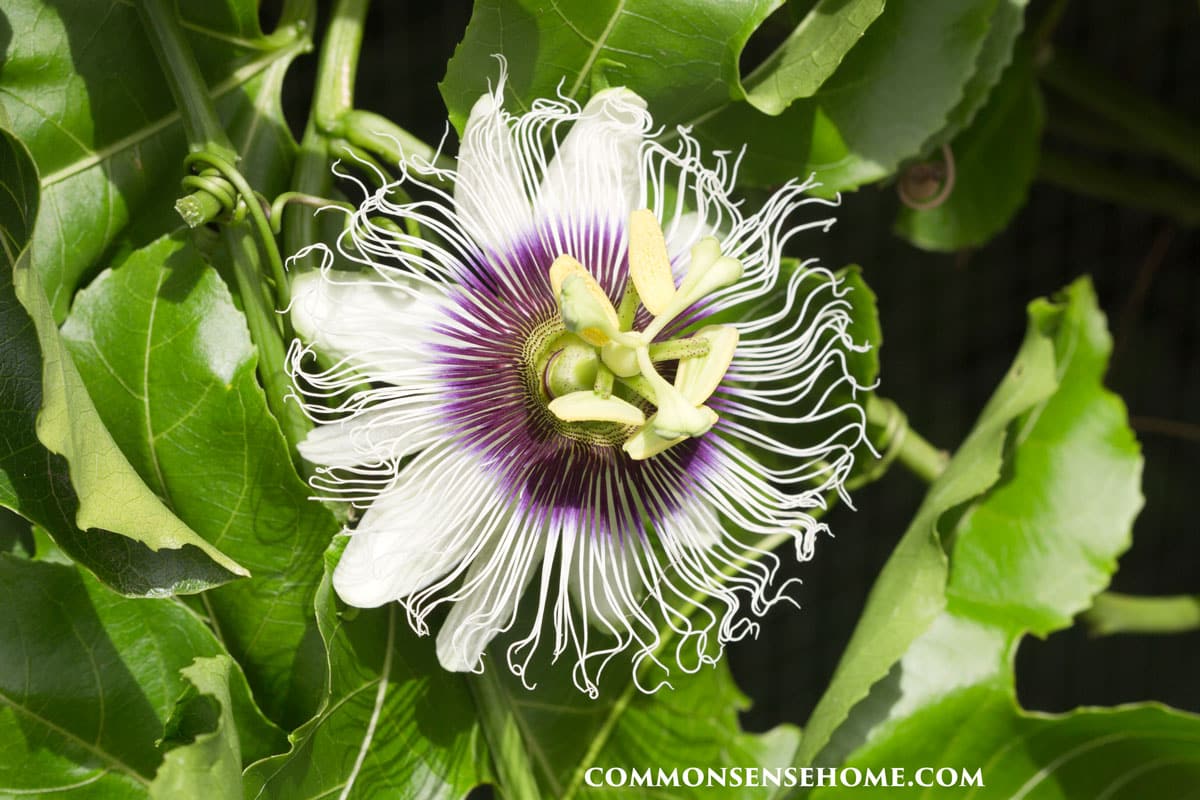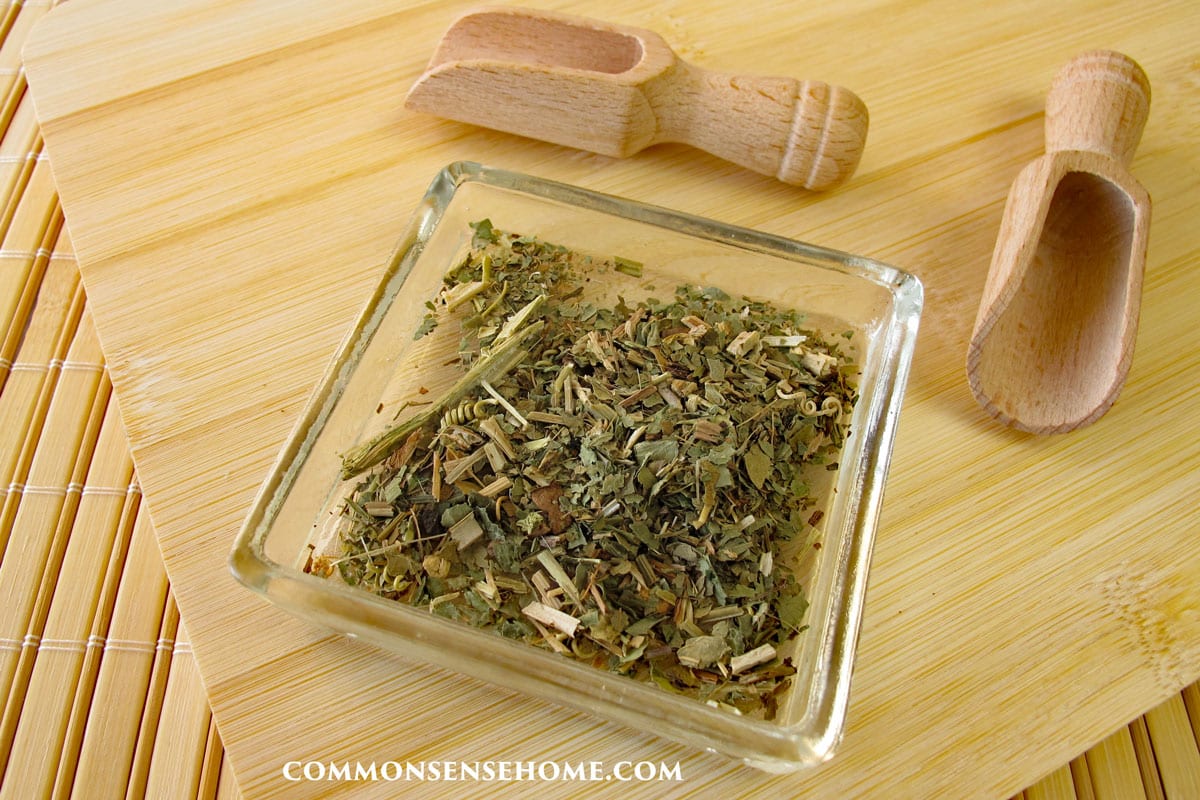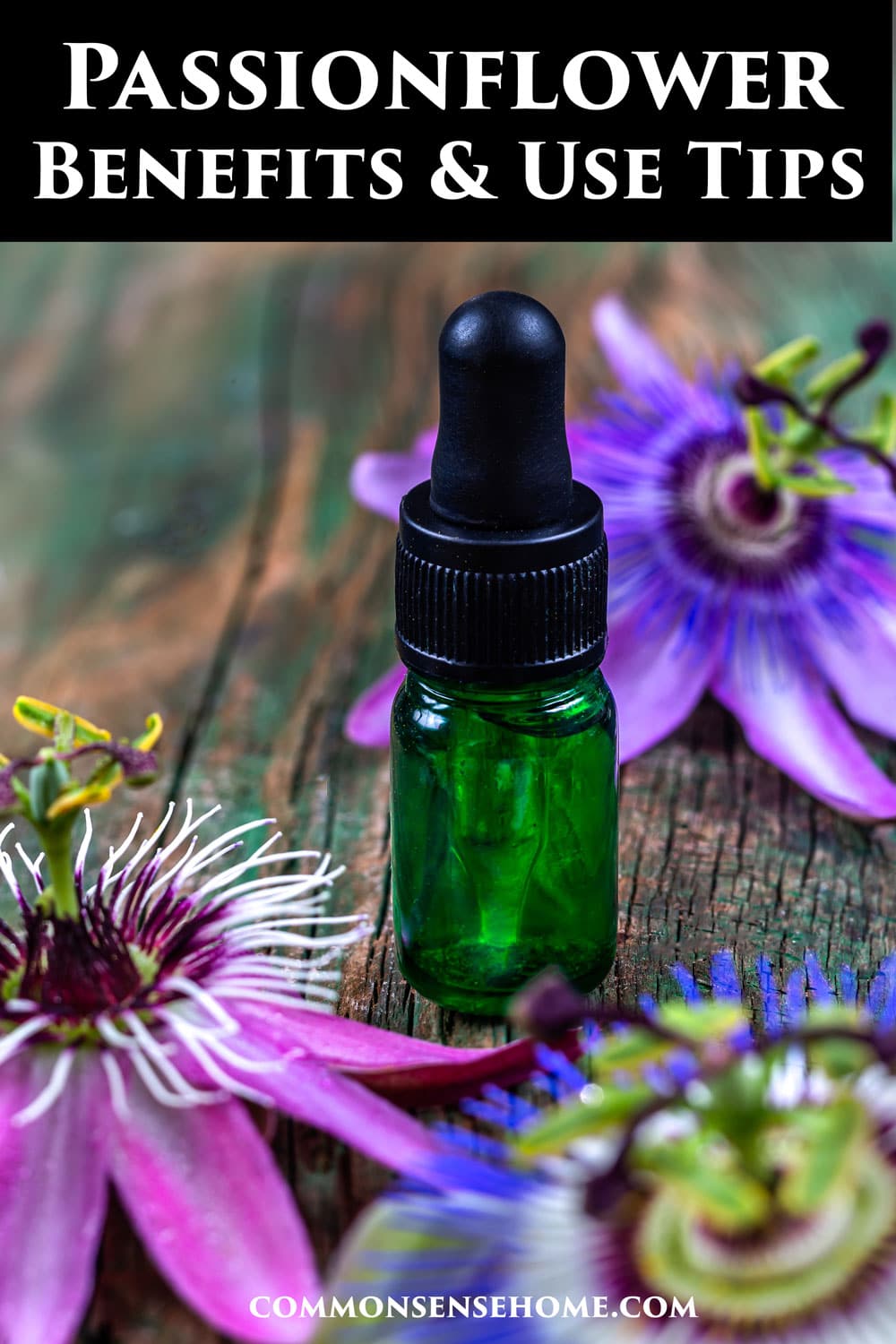Passionflower Benefits and Use Tips
This post may contain affiliate links. Read my full disclosure here.
Passionflower, Passiflora incarnata, commonly known as maypop, is a climbing vine native to the southeastern United States. Its calming effect helps to reduce anxiety and aid sleep. We share the benefits of passionflower and how to use one of nature’s best sedatives.

Background and Traditional Use
Passiflora incarnata is a member of the Passifloraceae family, known for its unique flowers and medicinal use. Native American tribes used it to treat various conditions, including anxiety, insomnia, and seizures.
Maypop is related to Passiflora edulis, the large purple passion fruit native to South America. P. incarnata is the species used for medicine, while P. edulis is grown for fruit. Maypop fruit is edible, too, as are the flowers and young shoots and leaves.
Passion flower is relatively easy to grow, and it contributes visually striking blossoms to the garden. See “Growing Passionflower for Flowers, Fruit, & Herbal Remedies” for growing information.
Benefits of Passionflower
We use passionflower vines, leaves and flower buds for medicine. The active flavonoids are highest when flowers first emerge.
Actions
Passionflower has an affinity for the nervous system It’s actions are:
- Sedative (sleep aid)
- Hypotensive (lowers blood pressure)
- Analgesic (pain reliever)
- Antispasmodic (relieves cramps)
- Anticonvulsant (reduces convulsions/seizures)
- Nervine (supports central nervous system)
- Antidepressant (improves mood)
- Anxiolytic (anti-anxiety)
- Hypnotic (sleep aid)
Passionflower combines well with other herbs such as: lemon balm (Melissa officinalis), skullcap (Scutellaria lateriflora) and Catnip (Nepeta cataria). I add it to many formulas, especially when the patient is anxious.
Sleep
One of the primary benefits of passionflower is its effectiveness against insomnia. It invokes a gentle and relaxing sleep. It aids in both falling asleep initially and staying asleep throughout the night. Moreover, if you happen to wake up during the night, passionflower helps you return to sleep easily.
Passionflower helps calm thoughts that can disrupt your ability to start or continue sleeping. You wake up rested, without any “narcotic” hangover.
Combine passionflower with valerian root, hops (Humulus lupulus) or skullcap for better sleep. Passionflower offsets the negative effects of valerian root.
Anxiety
In herbal literature, passionflower has a history of treating anxiety. Passionflower increases a neurotransmitter called gamma-aminobutyric acid (GABA) in the brain. The GABA system produces relaxation and calmness.
Research also suggests that Passiflora extract effectively treats generalized anxiety disorder. Patients treated with passion flower had less cognitive impairment than those treated with Oxazepam (similar to Xanax).
Passion flower may also help with some cases of attention deficit hyperactivity disorder.
Opioid Withdrawal
Narcotic addiction is a serious health care problem. More than 2 million Americans abuse opioids. Opioids may cause drowsiness, mental fog, nausea and constipation. In extreme cases, they can slow breathing so much the patient dies.
Passionflower can help manage opioid withdrawal symptoms. A trial involving detoxification of opioid addicts compared clonidine plus passiflora extract with clonidine plus a placebo.
The results showed both options helped treat withdrawal symptoms. However, the group using passiflora showed better mental symptoms management, with no side effects from the passion flower.
Herbalists also use the benefits of passionflower to manage withdrawal symptoms from other substances. It pairs well with wood betony for this purpose.

Preparation and Dosage
You can use passionflower either fresh or dried in capsules, fluid extracts, infusions (tea), or tinctures. Capsules are easy to find in health food stores. Follow the directions for dosage.
Would you like to save this?
I prefer tinctures, because the plant has a somewhat bitter flavor. For tea, I blend with other herbs to help mask the flavor. Both options are easy to make at home.
Passionflower Tea
To make passion flower tea, combine 1/2 teaspoon of with 1-2 teaspoons of other herbs. Some common herbs to blend include lemon balm, skullcap, catnip, mint, and wood betony. (Choose your mix for flavor and health needs.)
Pour one cup of boiling water over the herbs and steep for 10 minutes, covered. Strain out herbs and sweeten with honey, if desired. Drink ½ cup in the morning and evening, or before bed for better sleep.
Passionflower Tincture
To make a tincture, fill the jar about half full with plant material, and then cover it with alcohol. High quality vodka is the most common choice.
For fresh flowers, buds, or leaves, use 75% alcohol (150 proof). For dry herb, use 50% alcohol (100 proof). Cover the jar, date, and label. Shake daily for 2-4 weeks to help break down the plant material.
Strain out the herbs using a fine mesh filter, coffee filter, or cheese cloth. Store your finished tincture in a cool, dark location. Date and label the jar and use within a year for best quality.
To use, take 30-60 drops, 3-5 times a day.

Contraindications
Consult with your health care provider if you are on prescription medication. Passionflower’s calming effect may enhance the effects of sedative medications, including:
- anticonvulsants
- barbiturates
- benzodiazepines
- drugs for insomnia
- tricyclic antidepressants
Additionally, passionflower amplify the impact of blood-thinning medications, such as:
- clopidogrel
- warfarin
- aspirin
Passionflower may enhance the effects of monoamine oxidase inhibitors (MAOIs), an older class of antidepressants. Do not use during pregnancy, as it may induce uterine contractions.
Try this herb in the evening when you are preparing for sleep. This gives you a chance to see how it makes you feel. It may cause drowsiness (likely) or dizziness. I hope you’ll find this natural calming herb to be a welcome addition to your home apothecary.
This article is part of the Home Apothecary series. Other articles in the series include:
White Willow Bark – Harvesting and Use
Ginger Root Uses & Health Benefits
Soothing Ginger Honey – Natural Remedy for Sore Throat and Coughs
Fennel Seed – Natural Digestive Aid

This article was written by Sylvia Gunther.
Sylvia studied under Rosemary Gladstar and earned the distinction of Traditional Herbalist. She then studied Clinical Herbalism through The Herbal Academy, where she continues her life long exploration of herbs.
Sylvia and her husband live in North Central Indiana. Together they raised six beautiful children.




